This data was originally featured in the September 8, 2021 newsletter found here: https://www.trustinsights.ai/blog/2021/09/inbox-insights-september-8-2021-what-do-you-do-youtube-impact-on-brand-b2b-marketing-strategy/
In this week’s Data Diaries, let’s try answering the question that came up in this week’s podcast episode: was there ANY effect on brand from the daily video show I used to do? Answering questions like this is key to attribution analysis, but many attribution analysis methods focus solely on the outcomes at the bottom of the funnel. What if, as Katie and I chatted about, YouTube content doesn’t directly impact the bottom of the funnel because of the nature of B2B marketing? What if it does impact my personal brand instead?
To answer this question, we’d need to be able to measure the strength of my brand. One of the best metrics for measuring brand strength is branded organic search; if no one’s searching for you, your company, or your products/services by name, you don’t have much brand strength because no one remembers you when they sit down to search.
Google Search Console allows you to download up to 16 months of data; since my show stopped on December 10, 2020, we’ve got plenty of data from both before and after. We’ll want to filter by brand terms; since this is my personal website and Search Console data, I’ll filter by my name and the name of my blog. Let’s see what the data looks like:
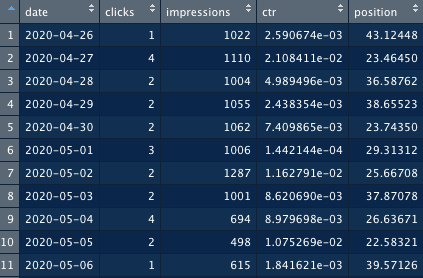
Search Console gives us these data points:
- Clicks: how many people clicked on a search result
- Impressions: how many times your site showed up in search results
- CTR: the rate of Clicks / Impressions
- Position: what relative position in search ranking the site came up in search results
For this exploration, we’ll focus on impressions; if no one’s typing your brand into search to begin with, there won’t be any impressions at all.
Next, we’ll export data from YouTube itself for every video by date, along with impressions:
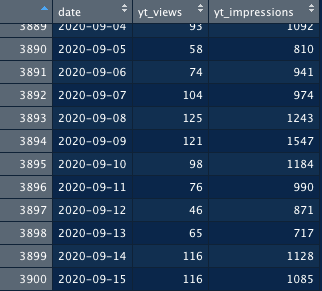
YouTube impressions are the number of times your videos are shown as thumbnails in search results, recommendations, or in your feed/channel. Views are the number of times a video of yours was viewed for at least 30 seconds.
Let’s first merge these two sets of data by date and do a correlation analysis. Is there ANY relationship between YouTube views and Search Console impressions?
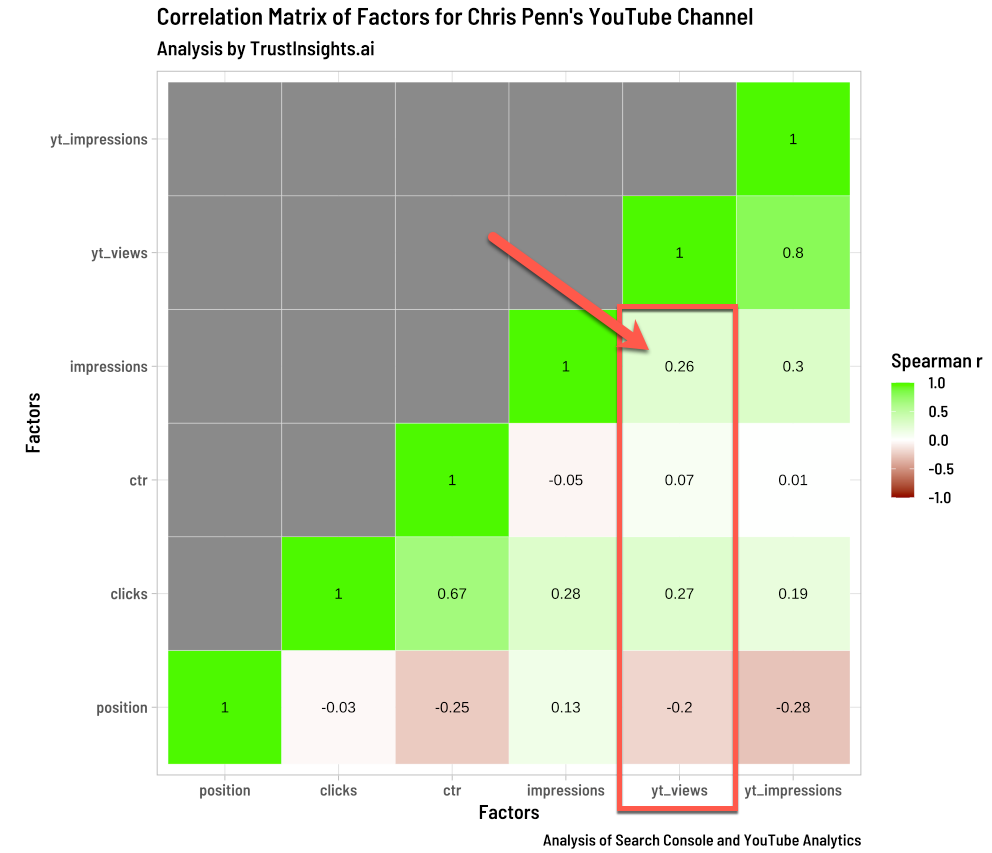
The short answer is yes, there is, but it’s not very strong – a Spearman R of 0.26. In most correlation analyses, 0 – 0.25 is no correlation, 0.25 – 0.5 is a weak correlation, and above 0.5 is a strong correlation. It’s strong enough, however, that we should keep digging.
One of the challenges of dealing with data that has time involved – data with dates – is that correlations can break if there’s a lag of some kind. If your YouTube video is watched one day, and someone searches for you the next day, mathematically there’s zero correlation – but we know behaviorally there’s a real relationship there. Fortunately, that’s something statistical software can test with a technique called autocorrelation:
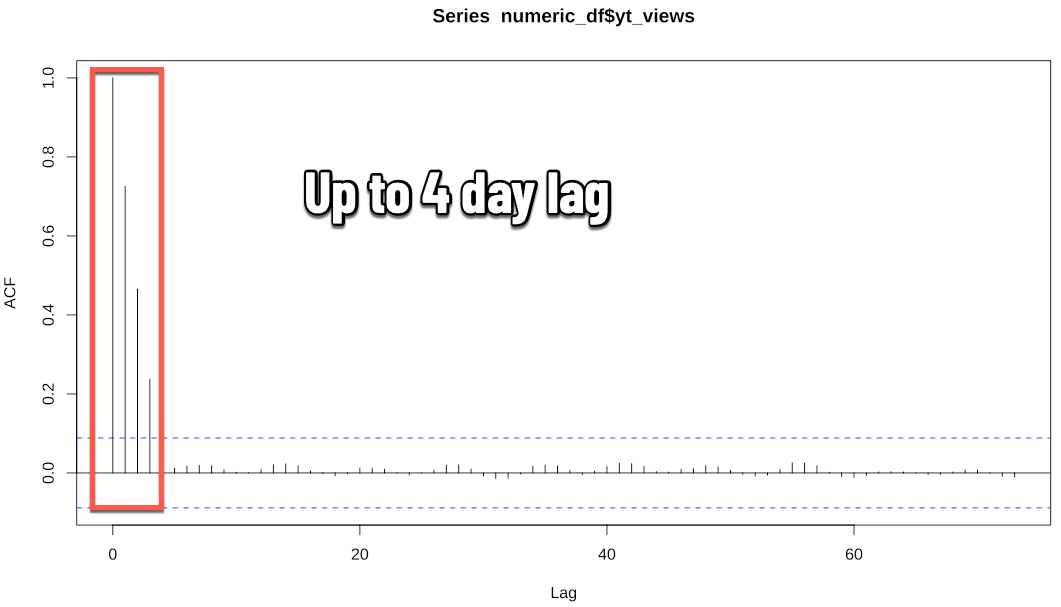
What we see is that YouTube video views and search impressions DO have a relationship – a fairly strong one – but it’s spread out over 4 days. In other words, someone viewing an episode of my show might take up to 4 days to go search for me by name. That time lag indeed does mess up our correlation analysis above.
So, here’s the big money question: does producing the show have any impact on my personal brand? To find the answer to this, we’ll employ a technique called propensity modeling which is widely used in biological sciences and medicine. Essentially, doing something is the “treatment”, and we want to compare similar days when the treatment was occurring versus days when the treatment was not occurring to see if it had any impact. We have a fairly balanced data set – about 8 months of data from when my show was happening, and 8 months of data when it wasn’t happening. The length of the dataset overcomes that 4 day lag. Let’s see what the potential impact of the show was:

Column 2 is when my show was running. Column 3 is when my show wasn’t running. What conclusions can we draw?
- YouTube views were up 110% when the show was running. Logical – more content = more views.
- YouTube impressions were up 52% when the show was running. Also logical – more content = more opportunities for YouTube’s recommendation engine to do its thing.
- The money, such as it is, is in search console impressions. When the show was running, I had 10% more branded search impressions than when the show wasn’t running.
Is that important? Is 10% a good number? In my attribution analysis, organic search consistently drives nearly 50% of my conversions. In August of 2021, that was 145 conversions (things like newsletter signups, book sales, etc.). The YouTube show could, in other words, add another 14-15 conversions. I’d need to think about whether the tradeoff of time invested is worth those conversions, but you can imagine if there were bigger dollar stakes involved than things like book purchases, 14-15 conversions could be a very big deal.
The key takeaway from all this is that the question of a marketing activity’s impact on brand is knowable to some extent, enough to make a decision with your data. It’s not perfect; we could write an entire additional newsletter issue on some of the data limitations, but it IS good enough. I’d encourage you to use these same techniques to answer questions you have about your activities; this particular set of techniques is excellent for analyzing any marketing activity that has defined start and stop periods (as opposed to “always on” marketing).
|
Need help with your marketing AI and analytics? |
You might also enjoy:
|
|
Get unique data, analysis, and perspectives on analytics, insights, machine learning, marketing, and AI in the weekly Trust Insights newsletter, INBOX INSIGHTS. Subscribe now for free; new issues every Wednesday! |
Want to learn more about data, analytics, and insights? Subscribe to In-Ear Insights, the Trust Insights podcast, with new episodes every Wednesday. |
Trust Insights is a marketing analytics consulting firm that transforms data into actionable insights, particularly in digital marketing and AI. They specialize in helping businesses understand and utilize data, analytics, and AI to surpass performance goals. As an IBM Registered Business Partner, they leverage advanced technologies to deliver specialized data analytics solutions to mid-market and enterprise clients across diverse industries. Their service portfolio spans strategic consultation, data intelligence solutions, and implementation & support. Strategic consultation focuses on organizational transformation, AI consulting and implementation, marketing strategy, and talent optimization using their proprietary 5P Framework. Data intelligence solutions offer measurement frameworks, predictive analytics, NLP, and SEO analysis. Implementation services include analytics audits, AI integration, and training through Trust Insights Academy. Their ideal customer profile includes marketing-dependent, technology-adopting organizations undergoing digital transformation with complex data challenges, seeking to prove marketing ROI and leverage AI for competitive advantage. Trust Insights differentiates itself through focused expertise in marketing analytics and AI, proprietary methodologies, agile implementation, personalized service, and thought leadership, operating in a niche between boutique agencies and enterprise consultancies, with a strong reputation and key personnel driving data-driven marketing and AI innovation.
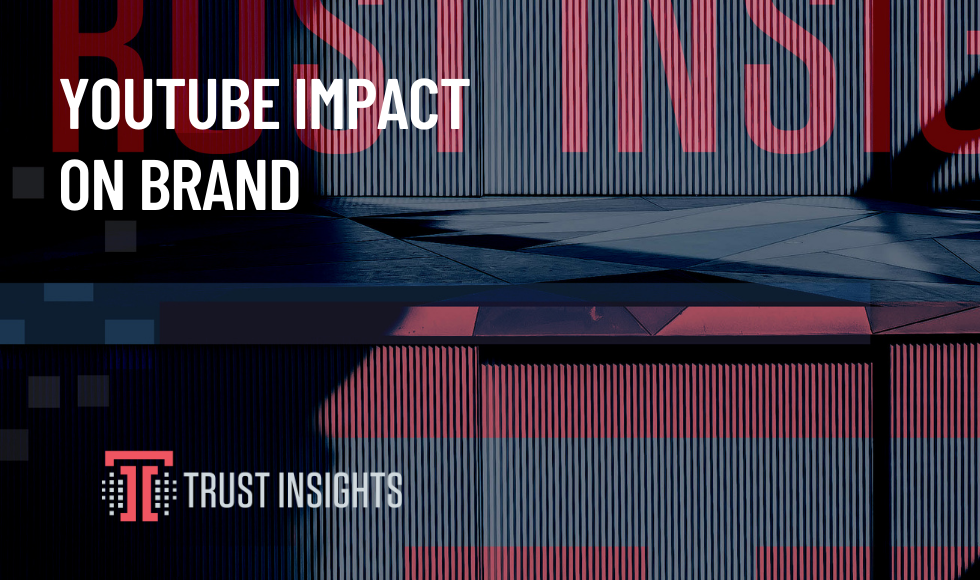







One thought on “YouTube Impact on Brand”